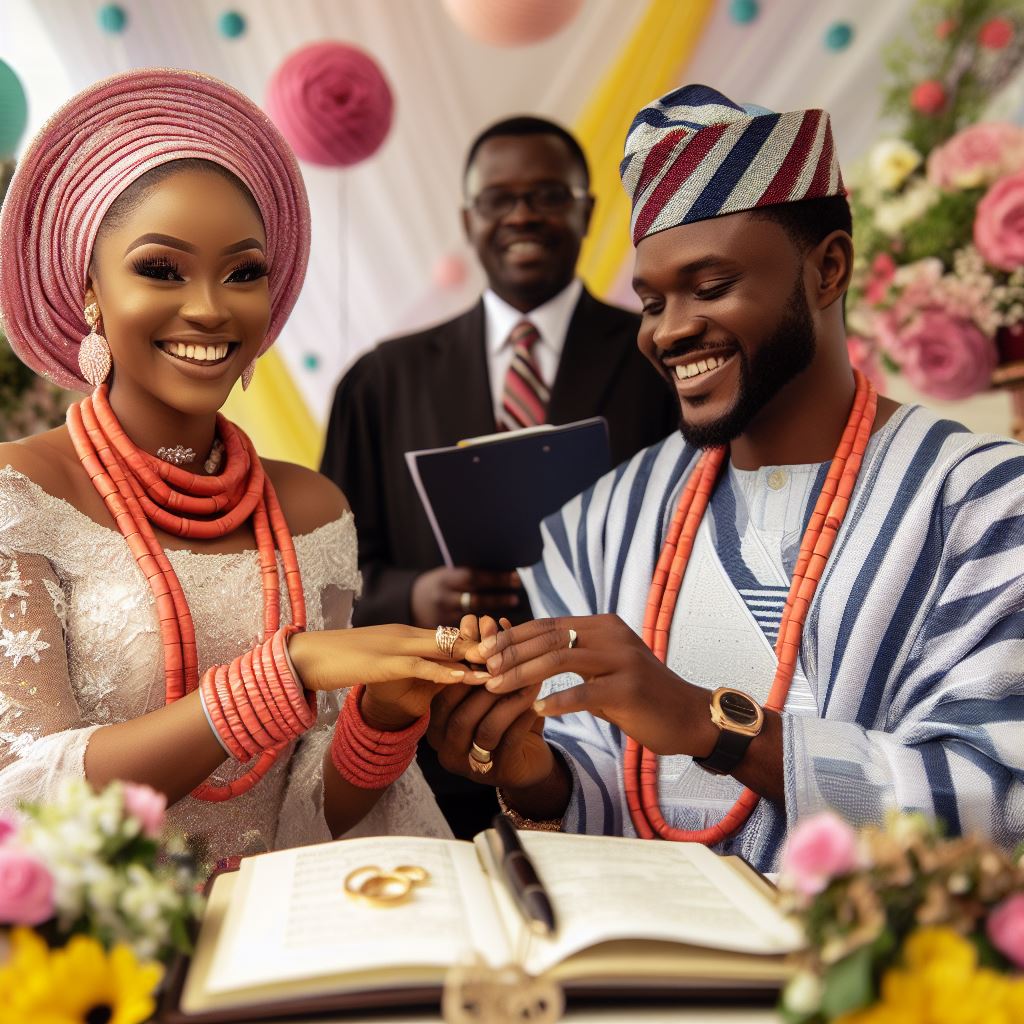Marriage Act in Nigeria: Implications for Interfaith Couples
Last Updated on October 16, 2023
Introduction
Nigeria’s Marriage Act, dating back to 1914 and amended several times, holds great significance in regulating marital bonds.
Interfaith unions, where partners practice different faiths, especially Christianity and Islam, form a substantial portion of the country’s marriages.
This blog post serves the purpose of unraveling the intricate nuances of the Nigerian Marriage Act and its profound consequences on interfaith couples.
We will explore the legal and personal facets of these unions, shedding light on the challenges and opportunities they present within the framework of Nigerian law and society.
Understanding the Marriage Act in Nigeria
In this section, we will delve into the Marriage Act in Nigeria and explore its implications for interfaith couples.
It is important to understand the provisions of this act, as well as the legal requirements for a valid marriage, the recognition of different types of marriages, and the implications of non-compliance with the act.
Overview of the Marriage Act and its provisions
- The Marriage Act is a legislation that governs the solemnization and registration of marriages in Nigeria.
- It provides a legal framework for the administration and regulation of marriages in the country.
- The act sets out the procedures and requirements for the validity of marriages.
- It also addresses issues such as the age of marriage, consent of parties, and prohibitions.
- Under the act, marriages must be solemnized in the presence of a registrar and at least two witnesses.
Legal requirements for a valid marriage in Nigeria
- Parties to a marriage must have the legal capacity to marry, which includes being of a certain age and mental capacity.
- Consent of both parties is essential, and any marriage without free consent is voidable.
- The act requires the presence of a registrar and witnesses during the solemnization of the marriage.
- The marriage must be accompanied by the issuance of a marriage certificate by the registrar.
- Parties to a marriage must not be within the prohibited degrees of relationship as outlined in the act.
Recognition of different types of marriages under the Act
- The Marriage Act recognizes both civil and customary marriages.
- Civil marriages are performed in accordance with the provisions of the act and are legally recognized.
- Customary marriages, on the other hand, are governed by customary law and must comply with certain requirements to be recognized.
- Other forms of marriages, such as religious or traditional marriages, may be recognized if they comply with the act’s requirements.
- Interfaith marriages are also recognized under the act, but certain conditions must be met for the marriage to be valid.
Implications of non-compliance with the Act
- A marriage that does not comply with the provisions of the act may be deemed void or voidable.
- Non-compliance can result in legal and social consequences, including lack of recognition and rights.
- Non-registered marriages may not have legal protection or access to certain benefits and privileges.
- Interfaith couples who do not comply with the act may face challenges in terms of recognition and acceptance.
- It is essential for interfaith couples to ensure compliance with the act to protect their rights and the validity of their marriage.
Basically, the Marriage Act in Nigeria plays a significant role in regulating marriages in the country.
It is crucial for interfaith couples to understand the provisions of the act, the legal requirements for a valid marriage, the recognition of different types of marriages, and the implications of non-compliance.
By adhering to the act’s requirements, interfaith couples can ensure the validity and protection of their marriage under Nigerian law.
Read: How the Marriage Act in Nigeria Affects Property Rights
Interfaith Marriages in Nigeria
Definition and prevalence of interfaith marriages
Interfaith marriage refers to a union between individuals from different religious backgrounds.
In Nigeria, this generally involves couples from the Muslim and Christian faiths.
The prevalence of interfaith marriages in Nigeria has been increasing over the years.
The country’s diverse religious landscape, with a significant Muslim and Christian population, contributes to the occurrence of such unions.
Challenges faced by interfaith couples in Nigeria
Interfaith couples in Nigeria encounter several challenges due to their divergent religious beliefs.
Opposition from family members, particularly parents, can be one of the primary difficulties faced by interfaith couples.
Religious differences may also lead to conflicts over the choice of religious practices, ceremonies, and traditions to follow within the marriage.
Importance of religious beliefs in Nigerian society
Religious beliefs hold a significant place in Nigerian society, influencing individuals’ day-to-day lives and shaping their cultural values.
This importance often translates into expectations for individuals to marry within their own religious communities.
Religious leaders and societal norms play crucial roles in upholding these expectations, making it challenging for interfaith couples to gain acceptance.
Social and cultural implications of interfaith marriages
The social and cultural implications of interfaith marriages in Nigeria can be considerable.
These unions have the potential to foster understanding and bridge religious divides, promoting unity and peaceful coexistence.
However, they can also lead to tensions and conflicts within families and communities, especially if acceptance is not readily granted.
Interfaith couples may face discrimination, rejection, and isolation, further exacerbating the challenges they already encounter.
Read: Differences Between Traditional and Statutory Marriages in Nigeria
Implications of the Marriage Act for Interfaith Couples
Interfaith marriages in Nigeria are subject to various provisions of the Marriage Act.
These legislations are crucial to ensure legal recognition and protection of the rights of interfaith couples.
By understanding the implications of the Act, interfaith couples can navigate the requirements and restrictions that apply to their marriage.
Relevant provisions of the Marriage Act concerning interfaith marriages
- Interfaith marriages are recognized, provided both parties are of legal age and give their consent.
- Couples must provide a notice of marriage at the registry and declare their religious affiliations.
- If the parties belong to different faiths, they must choose which religion the marriage will be conducted under.
- Both parties are required to attend marital counseling sessions before the marriage can take place.
Restrictions and requirements for interfaith marriages under the Act
- The Act prohibits marriage between individuals who are already legally married.
- Valid marriage certificates must be obtained from the marriage registry.
- Minimum age requirements must be met – 18 years for males and 16 years for females.
- Consent from the parents or guardians is required if either party is underage.
Legal consequences of not following the Act for interfaith couples
- Failure to comply with the Act may deem the marriage invalid and unrecognized by the law.
- An unregistered interfaith marriage may cause difficulties in accessing legal rights and benefits.
- In the case of divorce, property distribution and custody of children may be complicated.
- The children of an unregistered interfaith marriage may face challenges in obtaining legal recognition.
Importance of understanding the implications for interfaith couples
- Being aware of the Marriage Act provisions helps interfaith couples navigate legal requirements.
- Understanding the Act ensures that interfaith couples can protect their rights and interests.
- Complying with the Act provides legal security and recognition for the interfaith marriage.
- Knowing the implications of the Act facilitates smoother processes, such as divorce or child custody.
Relevant provisions of the Marriage Act concerning interfaith marriages
Under the relevant provisions of the Marriage Act, interfaith marriages are recognized as long as both parties are of legal age and give their consent.
Additionally, couples must provide a notice of marriage at the registry and declare their religious affiliations.
If the parties belong to different faiths, they must also decide which religion the marriage will be conducted under.
Attending marital counseling sessions is another requirement mandated by the Act.
Restrictions and requirements for interfaith marriages under the Act
Restrictions and requirements further regulate interfaith marriages under the Act.
Marrying someone who is already legally married is strictly prohibited.
Valid marriage certificates must be obtained from the marriage registry to ensure the marriage is legally recognized.
There are also minimum age requirements – 18 years for males and 16 years for females – and consent from parents or guardians is necessary if either party is underage.
Legal consequences of not following the Act for interfaith couples
Non-compliance with the Marriage Act can have significant legal consequences for interfaith couples.
Failure to follow the Act may render the marriage invalid in the eyes of the law, which can lead to complications during divorce or property distribution.
Additionally, an unregistered interfaith marriage may result in difficulties accessing legal rights and benefits.
The children of such marriages might also face challenges in obtaining legal recognition.
Importance of understanding the implications for interfaith couples
Understanding the implications of the Marriage Act is essential for interfaith couples.
By being aware of the provisions, they can navigate the legal requirements and protect their rights and interests.
Compliance with the Act ensures that the interfaith marriage is legally recognized and provides security in terms of legal rights.
Moreover, knowledge of the Act’s implications helps facilitate smoother processes, such as divorce or child custody, by ensuring couples are informed and prepared.
Generally , interfaith couples in Nigeria must familiarize themselves with the relevant provisions of the Marriage Act.
These provisions outline the requirements and restrictions that apply to interfaith marriages.
By understanding the Act, interfaith couples can ensure their marriage is legally recognized, protect their rights, and navigate legal processes more smoothly.
Compliance with the Act is crucial for the legal security and well-being of interfaith couples in Nigeria.
Read: Understanding Nigeria’s Marriage Act: A Comprehensive Guide

Overcoming Challenges and Finding Solutions
Interfaith couples in Nigeria face various challenges due to the legal limitations imposed by the Marriage Act.
However, there are ways to overcome these challenges and find meaningful solutions.
This section explores some important strategies for interfaith couples in Nigeria to navigate and strengthen their relationships.
Legal options for interfaith couples in Nigeria
One option for interfaith couples is to opt for a civil marriage, which falls under the jurisdiction of the court rather than religious bodies.
This allows couples to bypass the religious limitations imposed by the Marriage Act. Civil marriages provide a legal framework for interfaith couples to solemnize their union without infringing upon their religious beliefs.
Role of mediation and counseling in resolving conflicts
Mediation and counseling can play a crucial role in addressing conflicts that may arise in interfaith marriages.
These conflicts often stem from differences in religious practices and beliefs.
Mediation can provide a neutral platform where couples can express their concerns and find common ground.
Counseling, on the other hand, helps couples develop effective communication strategies, empathy, and problem-solving skills to navigate religious differences.
Advocacy for change in the Marriage Act to accommodate interfaith unions
Advocacy efforts should be made to bring about changes in the existing Marriage Act that recognize and accommodate the unique needs of interfaith unions.
This involves engaging with lawmakers, religious leaders, and advocacy groups to push for amendments that promote inclusivity and respect for diverse religious backgrounds.
Such changes would provide interfaith couples with legal protection and recognition, ensuring their rights are upheld.
Importance of mutual respect and understanding in interfaith marriages
Above all, mutual respect and understanding are essential in interfaith marriages.
Both partners must appreciate each other’s religious beliefs, practices, and values.
This involves actively learning about each other’s faiths, engaging in constructive dialogue, and embracing the richness of diversity within their relationship.
By fostering an environment of respect and understanding, interfaith couples can build a strong foundation for their marriage.
In general, interfaith couples in Nigeria can face significant challenges due to the limitations imposed by the Marriage Act.
However, by exploring legal options such as civil marriages, seeking mediation and counseling, advocating for legislative changes, and cultivating mutual respect and understanding, these couples can overcome obstacles and find harmony in their interfaith unions.
It is crucial to recognize and celebrate the diversity that interfaith marriages bring, as it enriches society and promotes unity amidst religious differences.
Read: The Role of Faith in Upholding a Sanctified Marital Relationship
Conclusion
Recap of key points discussed in the blog post
In this blog post, we explored the implications of the Marriage Act in Nigeria for interfaith couples.
We examined the legal framework surrounding marriages in Nigeria and its impact on mixed religious unions.
We discussed how the Marriage Act requires couples to adhere to certain religious practices during the marriage ceremony, which can pose challenges for interfaith couples.
The Act also recognizes only certain religious marriages as legally valid, creating potential issues for those in mixed religious unions.
Furthermore, we highlighted the significance of awareness and understanding of the Marriage Act for interfaith couples.
Being knowledgeable about the legal requirements and implications can help couples navigate the challenges they may face.
Emphasis on the need for awareness and understanding of the Marriage Act
It is crucial for interfaith couples to familiarize themselves with the provisions of the Marriage Act in order to make informed decisions and protect their rights.
Seeking legal advice and support from professionals specializing in family law can be highly beneficial.
Understanding the legal landscape can help interfaith couples plan their wedding ceremony in accordance with the requirements of the Act, ensuring that their marriage is legally recognized and protected.
Encouragement for interfaith couples to seek legal advice and support
We strongly encourage interfaith couples to consult with lawyers who specialize in family law.
These legal professionals can provide tailored advice and guidance to navigate the complexities of marrying under the Marriage Act.
By seeking legal counsel, interfaith couples can ensure that their rights and interests are safeguarded throughout the process, enabling them to create a strong foundation for their lifelong journey together.
Closing thoughts
Ultimately, it is important for Nigerian society to embrace inclusivity when it comes to marriages, recognizing and respecting the choices made by interfaith couples.
By promoting a more inclusive understanding of marriage, Nigeria can foster a society where diverse religious backgrounds are celebrated, and individuals are free to exercise their beliefs, while still upholding the legal requirements of the Marriage Act.
It is our hope that through increased awareness, understanding, and support, interfaith couples in Nigeria can navigate the intricacies of the Marriage Act and build successful, legally protected marriages.


